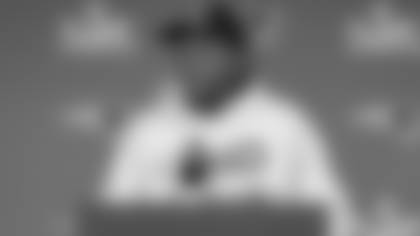PITTSBURGH (Oct. 26, 2006) -- This is what Ben Roethlisberger and coach Bill Cowher were looking for: a normal day of practice for the quarterback.
Roethlisberger, four days removed from a concussion caused by a painful helmet-by-helmet hit in Atlanta, took most of the snaps with the Pittsburgh Steelers ' starting offense and looked ready to play in Oakland.
"I'm very encouraged by how he feels," Cowher said.
Roethlisberger admittedly was jolted by the jaw-jamming hit he received from the Falcons defensive end Chauncey Davis that knocked him out for a few minutes during the third quarter and forced him to leave the Steelers' 41-38 overtime loss.
But Roethlisberger looked as comfortable and relaxed in practice as he did while slapping high fives with LeBron James following a dunk by the Cavaliers star during an exhibition game in Pittsburgh on the night of Oct. 25.
Cowher said a final decision on the QB's status won't be made until game time, mostly because Roethlisberger still must pass more of the post-concussion tests he takes daily. He has passed all tests so far, but any recurring symptoms or setbacks would cause him to sit out the game.
Oct. 26 is one of the Steelers' two major practice days of the week, and any injured player who practices as usual almost always plays on Sunday barring a later setback.
"He took all his reps, he felt very good, and we'll see how he feels tomorrow (Friday)," Cowher said. "We'll see how he feels after he flies across the country."
Playing the 24-year-old Roethlisberger only a week after he received his second concussion since June might seem to be a risky move by the Steelers, given his long-term importance to them. Roethlisberger is viewed within the organization as their most prized quarterback since Terry Bradshaw in the 1970s.
But the Steelers (2-4) place considerable value in the post-concussion tests that were developed by two doctors and their research teams at the University of Pittsburgh, Joseph Maroon and Mark Lovell, and are widely used in the NFL.
"I feel very comfortable with the fact our doctor here, Dr. Maroon, is one of the experts that a lot of people have come to in regards to this injury, so I'm very comfortable," Cowher said. "To me, this is not my decision, it's the doctor's decision."
A player is tested initially when he is healthy, and the results are compared later to those after a player has received a concussion. The tests measure memory, motor skills and speed of response, and any recurring post-concussion symptoms normally show up immediately. Any player who has such symptoms is told he should not play.
"From talking to Dr. Maroon I think that people always speculate that after you have one concussion, you're susceptible to more and then more on top of that," Roethlisberger said. "But from what we've researched and understood is that as time passes, that susceptibility goes away."
However, Roethlisberger's symptoms -- being unconscious on the field, memory loss and headaches -- are commonly defined by some prominent neurosurgeons as being consistent with a severe concussion.
Some doctors and researchers in the field believe NFL players are allowed to return too quickly from concussions. Among the recent stars who retired because of concussion-related problems were quarterbacks Steve Young and Troy Aikman.
Since June, Roethlisberger sustained facial injuries and a concussion while being tossed off his motorcycle at nearly 40 miles per hour and thrown onto a car; had his appendix removed and received a second concussion from the on-field hit.
"Its been a bad few months," he said. "Hopefully, it will get better."
Meanwhile, Pro Bowl linebacker Joey Porter (hamstring) also looks ready to go against Oakland (1-5) after being upgraded from questionable to probable. He has missed two games.
Clark Haggans (ankle), the other outside linebacker, and nose tackle Casey Hampton (hamstring) did not practice and remain questionable.




























